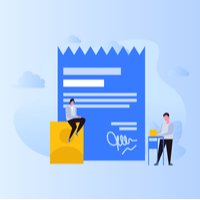A contract template includes sections of boilerplate language—terms and phrases that rarely, if ever, change from agreement to agreement. By starting from a uniform draft, lawyers can save time and resources in the earliest stage of contract negotiation. However, there are drawbacks to template agreements, as errors can arise at many points during the process.
.jpg?width=650&name=shutterstock_1743610013%20(1).jpg)
Contract analysis powered by artificial intelligence (AI) allows for quicker and more accurate negotiation, whether using templates or not. Legal departments that invest in AI contract analysis can streamline contract negotiation and dramatically reduce the time and effort required to finalize agreements.
Pitfalls in Working From a Contract Template
For most legal departments, the process of contract negotiation begins with cutting and pasting from a template. However, there are potential problems in working from templatized agreements. Consider some of the following:
- Templates change and are often lost. A companywide computer system can house a vast, complex maze of documents. Without fastidious organization, templates can get lost or inadvertently altered without permission. Worse yet, associates may work from old template drafts, rather than the most up-to-date standards.
- Templates lack flexibility. Contract terms may not apply to every client, and certain negotiations may require additional terms not covered in a template. Additionally, new clients may not understand the in-depth terms used in an updated template for a long-term client.
- Templates are cost-prohibitive. Law firms that draft a broad range of documents will find that producing and maintaining template contracts can be costly. The nature of a firm’s business can change unpredictably over time, creating the need for new templates and leading others to become obsolete.
- Templates lack an effective way to limit context-based risk. When the context is not clear, a one-size-fits-all model contract will often rely on excessive verbiage to cover all bases, resulting in confusing passages that have lost their meaning.
- Templates are replicating subpar work. Without a rigorous playbook, template-based contracts can reproduce inconsistent, unreliable language. If there is a problem with vague terms, omissions, or errors, finding and updating all instances can pose a significant challenge.
Given all of these limitations, companies need a modern solution to streamline contract analysis for template agreements. Recent technological advances in AI, machine learning, and natural language processing (NLP) have enabled legal departments and procurement teams to automate and accelerate the contract review and negotiation process.
How AI Contract Analysis Applies to Template Agreements
If you are faced with having received a contract generated from a one-size-fits-all template, AI can step in and quickly, easily, and accurately negotiate it to make it more relevant to the deal. Listed below are several benefits AI contract analysis can bring to your negotiations:
- Maintaining uniform consistency: Manual contract review is a labor-intensive process, often requiring more than one staff member. When clauses are mistakenly omitted or altered, the AI can suggest revisions based on your organization’s guidelines. Moreover, the AI can accomplish this review at scale and identify outlying provisions in minutes.
- Redlining problematic provisions: AI performs better than humans at identifying missing, incorrect, and contradictory language. The technology can help attorneys create better templates using updated, effective, and clear terms. The most effective AI-powered solutions can automatically remove or update contract or template language to adhere to company guidelines.
- Elucidating areas of negotiation: Certain aspects of a contract require thoughtful consideration from client to client. The AI assesses passages requiring attention and enables attorneys to focus their time and attention on salient provisions. Reviewing attorneys can consult smart suggestions offered by the AI based on an evolving AI Digital Playbook.
- Reducing risk: Changing regulations can introduce substantial risk unless relevant provisions are updated to retain compliance. AI can assist legal departments in locating and revising templates and agreements with outdated language.
- Expediting review: Legal AI software can accomplish in minutes what would ordinarily take the best reviewers hours to achieve, including actual contract revisions and insertion based on company guidelines.
With the help of an AI contract negotiation platform, your legal department or procurement team can accelerate the contract analysis process while ensuring consistency and adherence to company standards. From Non-Disclosure Agreement (NDA) to Master Service Agreement (MSA) templates, an AI contract negotiation solution can help ensure agreement adherence to your organization’s standards while automatically raising your preferred positions.
LexCheck offers the next generation in contract analysis for template-based agreements. To learn more about our AI-powered platform, contact us at sales@lexcheck.com. If you’d like to experience the technology first-hand, request a demo.

.jpg?width=650&name=shutterstock_1743610013%20(1).jpg)